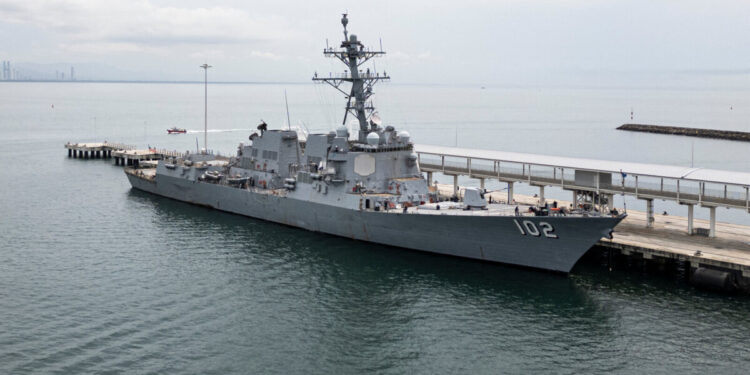US forces have struck a second vessel alleged to be carrying drugs in the Pacific Ocean, amid an escalating US campaign against seaborne drug smuggling.
Three people were killed and no US forces were harmed in the strike on Wednesday, Defence Secretary Pete Hegseth said. It came hours after the US struck another boat in the Pacific, killing two people.
Colombia’s government has denounced the US for carrying out strikes on vessels close to its coast, saying the American action was “like applying the death penalty in a territory that is not yours.”
Wednesday’s strikes were the first in Pacific waters, as most previous attacks were in the Caribbean.
“These strikes will continue, day after day. These are not simply drug runners, these are narco-terrorists bringing death and destruction to our cities,” Hegseth posted on X.
The post was accompanied by a video that appears to show a boat catching fire after being struck by a US bomb. Floating items are then seen in the water, before they appear to be targeted by a second air strike.
The Colombian deputy foreign minister, Mauricio Jaramillo, said the strikes were “disproportionate and outside international law.” He told BBC’s Newsday programme that those aboard had “no possibility to defend themselves.”
He added that there was “no process, no judicial order” and urged the US to instead cooperate with Colombia in the fight against drug trafficking.
US President Donald Trump has said he had the legal authority to continue bombing boats in international waters, but said he may go to the US Congress if he decided to expand the targets to include those on land.
He said his administration was “totally prepared” to expand the anti-drug operations onto land, which would mark a significant escalation.
The expansion of these strikes into the Pacific Ocean is significant. It is a far greater drug trafficking sea route than the Caribbean so, in that sense, this strike appears more consistent with the US justification.
However, it is still widely believed that these strikes are not only about drug trafficking but also about putting military pressure on the government of President Nicolás Maduro in Venezuela.
He is a longtime foe of Donald Trump who has long accused him of being the leader of a drug-trafficking organization, something he denies.
At least 37 people have been killed in the US strikes on alleged drug boats, including a recent strike on a semi-submersible vessel in the Caribbean.
Two men survived that strike last week, and were repatriated to Colombia and Ecuador.
Ecuador’s government later released its national, identified as Andrés Fernando Tufiño, saying there was no evidence of wrongdoing. The other man, from Colombia, reportedly remains hospitalized.
Both Colombia and neighbouring Ecuador have significant Pacific coastlines that experts say are used to funnel drugs north towards the US through Central America and Mexico.
US estimates from the Drug Enforcement Administration indicate that the vast majority of cocaine bound for US cities passes through the Pacific.
Drug seizures in the Caribbean, where the bulk of confirmed US strikes have so far taken place, account for a relatively small percentage of the total, although US officials have said it is rising.
To date, US officials have offered few details on the identities of those killed in the strikes or what drug trafficking organizations they allegedly belong to.
Around 10,000 US troops, as well as dozens of military aircraft and ships, have been deployed to the Caribbean as part of the operation.
The Pacific strikes represent geographic expansion of a controversial policy that bypasses judicial processes, with suspects killed without arrest, trial, or opportunity to surrender, raising questions about extrajudicial killings under international law.
Colombia’s characterization of the strikes as “applying the death penalty in a territory that is not yours” reflects growing Latin American frustration with unilateral US military actions in waters near their coasts, straining relationships with key anti-drug cooperation partners.
The second air strike targeting floating items in the water after the initial boat explosion suggests US forces attacked survivors or debris, potentially violating laws of war prohibiting attacks on shipwrecked persons no longer posing threats.
The 10,000 US troops deployed to the Caribbean for the operation represents massive military commitment comparable to combat deployments, raising questions about proportionality when traditional law enforcement interdiction methods could achieve similar results without lethal force.
Trump’s suggestion he may expand strikes to land-based targets would represent unprecedented escalation into sovereign territory of countries like Colombia, Ecuador, and potentially Mexico, likely triggering international condemnation and possible armed resistance.
The lack of disclosed identities or organizational affiliations for the 37 people killed prevents independent verification that victims were actually drug traffickers rather than fishermen, migrants, or others using boats for legitimate purposes in international waters.
Ecuador’s release of Andrés Fernando Tufiño after finding no evidence of wrongdoing demonstrates the risk of US strikes killing or injuring innocent people, with survivors facing arrest in their home countries before investigations clear them.
The DEA assessment that most US-bound cocaine transits the Pacific rather than Caribbean suggests previous US focus on Caribbean interdiction was geographically misplaced, though Pacific trafficking routes have always been well-known to drug enforcement professionals.
The strikes’ timing coinciding with tensions over Venezuelan President Nicolás Maduro supports theories that the operation serves dual purposes of disrupting drug flows while pressuring the Maduro government through military presence near Venezuelan waters.
Washington state’s significant Colombian and Ecuadorian immigrant populations mean local communities have direct connections to countries affected by US strikes, with families potentially impacted by operations that Colombian officials characterize as violations of international law.







